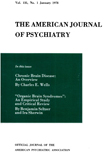DRUG-WITHDRAWAL PSYCHOSES
Abstract
Three patients who developed drugwithdrawal psychoses clinically resembling delirium tremens two to three days after admission to a general hospital are described. All three had been addicted to a hypnotic drug (chloral hydrate, carbromal and sodium pentabarbital respectively) prior to admission but had not been taking alcohol.
It is suggested that the syndrome of delirium tremens results from the association of a confusional psychosis with the alcohol (or sedative-drug) withdrawal syndrome and that the tremulous withdrawal psychosis of sedative drug addiction and the delirium tremens of alcoholism are clinically identical.
Access content
To read the fulltext, please use one of the options below to sign in or purchase access.- Personal login
- Institutional Login
- Sign in via OpenAthens
- Register for access
-
Please login/register if you wish to pair your device and check access availability.
Not a subscriber?
PsychiatryOnline subscription options offer access to the DSM-5 library, books, journals, CME, and patient resources. This all-in-one virtual library provides psychiatrists and mental health professionals with key resources for diagnosis, treatment, research, and professional development.
Need more help? PsychiatryOnline Customer Service may be reached by emailing [email protected] or by calling 800-368-5777 (in the U.S.) or 703-907-7322 (outside the U.S.).



